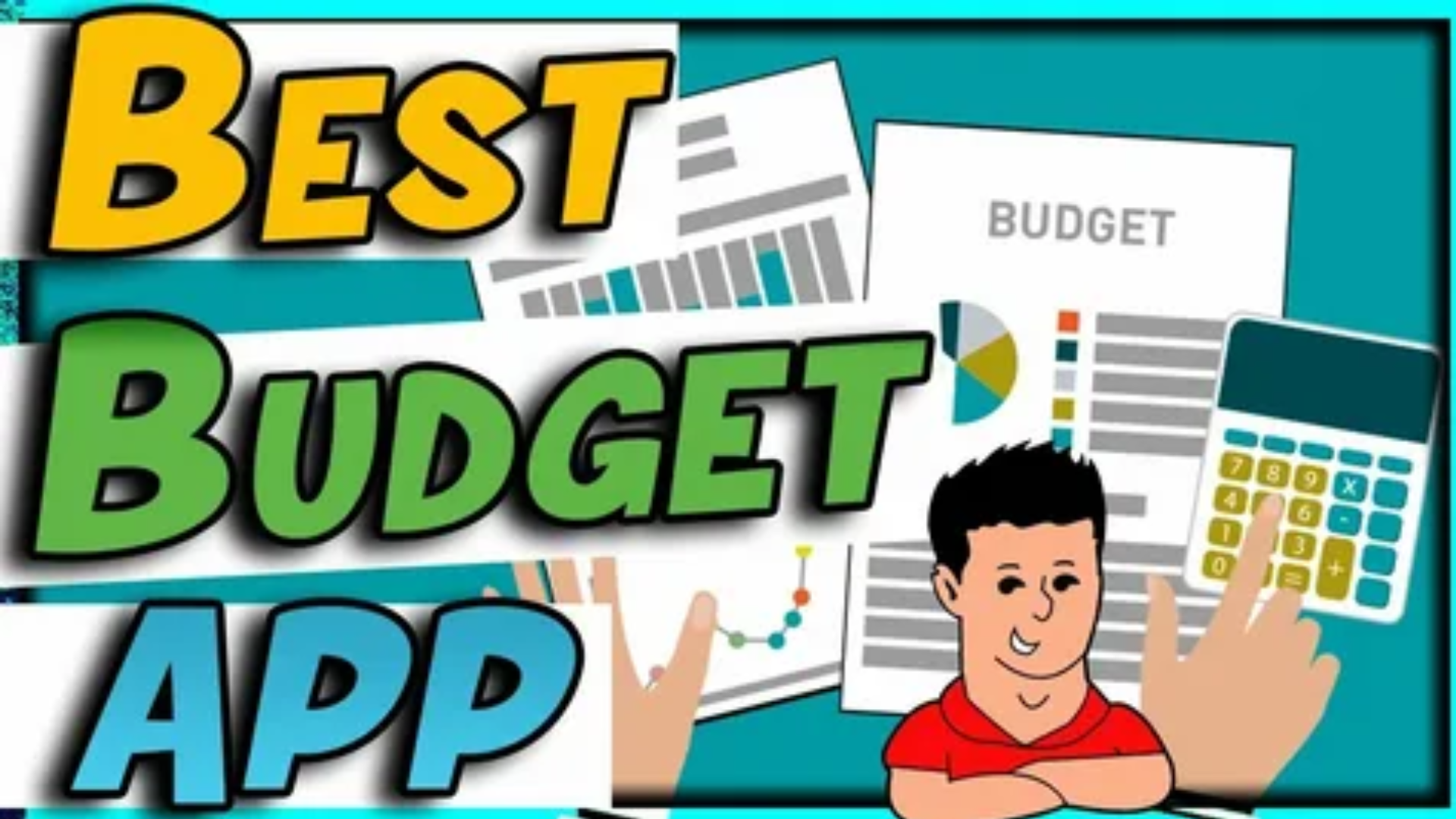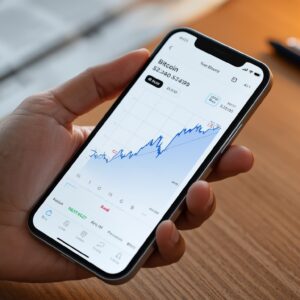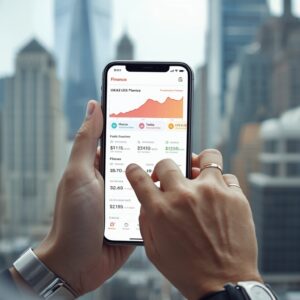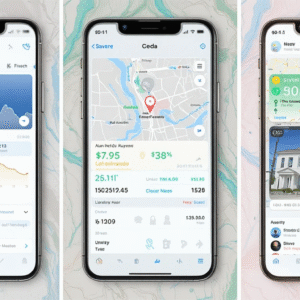Managing personal finance in today’s fast-paced world is essential. Thankfully, smartphones have made it easier to track spending, manage budgets, and even start investing—all from the comfort of our hands. In this article, we will take a close look at the top 10 iPhone finance apps in the USA that can help you with budgeting, saving, and investing.
1. Mint: A Budgeting King
When it comes to managing your budget, Mint is one of the top apps that many people swear by. This app gives you a complete picture of your financial life by allowing you to link your bank accounts, credit cards, and other financial assets. Mint provides you with a snapshot of your monthly expenses, categorizing them into easy-to-understand sections like groceries, utilities, entertainment, and more.
Key Features:
- Track all accounts: Link your checking, savings, credit cards, and even investments.
- Bill reminders: Get timely reminders for upcoming bills to avoid late payments.
- Budget tracking: Set a budget and get alerts when you are nearing your limit.
Pros:
- Free to use.
- Simple interface
- Automatic categorization
Cons:
- Limited investment tracking features
- Ads can be intrusive.
2. YNAB (You Need A Budget): For Those Who Want Control
YNAB is for those who want more control over their finances. Unlike other apps that focus on tracking your spending, YNAB encourages you to allocate specific amounts of money to different “buckets” (categories) such as rent, food, and savings. YNAB operates on the principle that each dollar should have a specific purpose, enabling you to concentrate on your objectives and cease living from one paycheck to the next.
Key Features:
- Goal setting: Set goals for each category and track your progress.
- Debt tracking: YNAB can help you pay off debt more effectively.
- Mobile sync: Sync your accounts between devices for seamless budgeting.
Pros:
- Strong budgeting philosophy
- Excellent customer support
- Helpful educational resources
Cons:
- The service is a paid subscription, yet it provides a 34-day free trial.
- Some learning curves.
3. Personal Capital: Your Money in One Place
Personal Capital is a hybrid app that offers both budgeting and investing tools. It’s perfect for someone who wants to manage their budget while also planning for their financial future. Personal Capital helps you track spending, but its real strength lies in tracking your investments. It pulls in data from your investment accounts and helps you understand how well your portfolio is performing.
Key Features:
- Net worth tracking: See how much you’re worth across all accounts.
- Investment tracking: Get insights into your portfolio, asset allocation, and performance.
- Retirement planning: Offers tools to help plan for retirement.
Pros:
- A comprehensive overview of finances
- Strong investment tracking features
- It’s free to use for budgeting.
Cons:
- Premium services can be expensive.
- It may be overwhelming for budget beginners.
4. Acorns: Invest While You Spend
Acorns is a well-liked option for novice investors seeking to explore the stock market with minimal effort. The app rounds up your everyday purchases to the nearest dollar and invests the change into a diversified portfolio. It’s a wonderful way to start investing without having to think about it too much.
Key Features:
- Round-ups: Automatically invest spare change from your purchases.
- Diversified portfolios: Choose from a range of portfolio options depending on your risk tolerance.
- Automatic rebalancing: Acorns keeps your portfolio balanced over time.
Pros:
- Super simple for beginners
- The initial investment is minimal, with round-ups starting at just $5.
- Offers retirement accounts (IRA)
Cons:
- Fees may add up if you don’t have much invested.
- Limited control over specific investments
5. Robinhood: Commission-Free Investing
Robinhood is well-known for being a commission-free trading platform, and it extends to its mobile app. It’s ideal for those who want to trade stocks, ETFs, and even cryptocurrencies without paying fees on every transaction. The app’s simplicity makes it perfect for those who want to start trading without the complexity of other platforms.
Key Features:
- No commissions: Trade without paying fees for every buy or sell.
- Cryptocurrency trading: Robinhood also allows you to invest in digital currencies.
- Fractional shares: Buy portions of expensive stocks with as little as $1.
Pros:
- Easy to use
- No commissions or hidden fees
- Ideal for beginners
Cons:
- Limited research and analysis tools
- Customer service has been criticized.
6. Stash: For Beginner Investors
For those who are new to investing but want to start with just a small amount of money, Stash is a great app. Stash offers a range of investment options, and you can begin investing with as little as $5. The app provides curated investment portfolios, making it simple for you to choose based on your risk tolerance and goals.
Key Features:
- Curated investment options include portfolios tailored to different risk levels.
- Fractional shares: Start investing with as little as $5.
- Retirement accounts: You can set up an IRA directly through the app.
Pros:
- Great for beginners
- Low minimum investment
- Easy-to-follow educational resources
Cons:
- Monthly fee (even for small balances)
- The app has fewer features than other investment apps.
- 7. PocketGuard: Keep Your Spending in Check
PocketGuard is a fantastic app if you want to see how much disposable income you have at any given moment. After linking your bank accounts, it tracks your income and expenses and shows you how much money you can spend without going over your budget. It’s a beneficial option for those who tend to overspend without realizing it.
Key Features:
- Spending tracker: Tracks your income and expenses to see how much you can spend.
- Automatic categorization helps you organize your spending into categories.
- Bill tracking ensures you don’t miss any payments by monitoring upcoming bills.
Pros:
- Easy-to-use interface
- Helps avoid overspending
- Free version available
Cons:
- Premium users can only access some features.
- Not as robust as investment tracking.
- 8. SoFi Invest: Invest and Borrow
SoFi Invest is an excellent app for people looking to control their financial future. You can use the app to invest in stocks, ETFs, and even cryptocurrency. It also offers automated investing options and the ability to borrow money for things like student loans or personal loans, making it a versatile tool for your financial needs.
Key Features:
- Automated investing: Hands-off investing for those who want to grow wealth passively.
- Stock and ETF investing: Choose individual stocks or diversified portfolios.
- Crypto trading: Buy, sell, and hold cryptocurrencies like Bitcoin and Ethereum.
Pros:
- No fee for most trades.
- Wide range of investment options
- Offers lending services
Cons:
- Limited research tools
- This may not be the best option for highly active traders.
9. EveryDollar: For Easy Budgeting
Financial expert Dave Ramsey created EveryDollar, an easy-to-use budgeting app. Dave Ramsey designed EveryDollar to assist you in creating and adhering to a zero-based budget, allocating each dollar you earn to a specific task. The app makes it simple to track your spending, manage bills, and work toward financial goals.
Key Features:
- Zero-based budgeting: Assign every dollar a purpose.
- Bill reminders: Receive alerts about impending bills.
- Debt payoff plan: Track your progress toward eliminating debt.
Pros:
- Simple, user-friendly design
- Free version available
- Focuses on financial goals
Cons:
- Premium versions are required for advanced features.
- Limited investment tools
10. Tally: Manage Your Credit Cards Smartly
Tally is a useful app for managing credit card debt. If you’re struggling to pay off multiple cards with varying interest rates, Tally can help you by consolidating your debt into one loan at a lower rate. The app helps you prioritize payments and saves you money by minimizing interest charges.
Key Features:
- Credit card debt management consolidates your balances into a single payment.
- Lower interest rates: Tally offers a lower rate than most credit cards.
- Automatic payments help you stay on top of your bills.
Pros:
- It can save you money on interest.
- Works with most major credit cards
- Simple to use.
Cons:
- Limited to credit card debt
- It is not applicable to other loan types.

Conclusion: Your financial future is in your hands.
There are plenty of finance apps out there, but these top 10 iPhone apps stand out for their ease of use, helpful features, and ability to make managing your budget and investments a lot more accessible. Whether you’re just starting to budget, looking to track your spending, or diving into investing, there’s an app for you.





